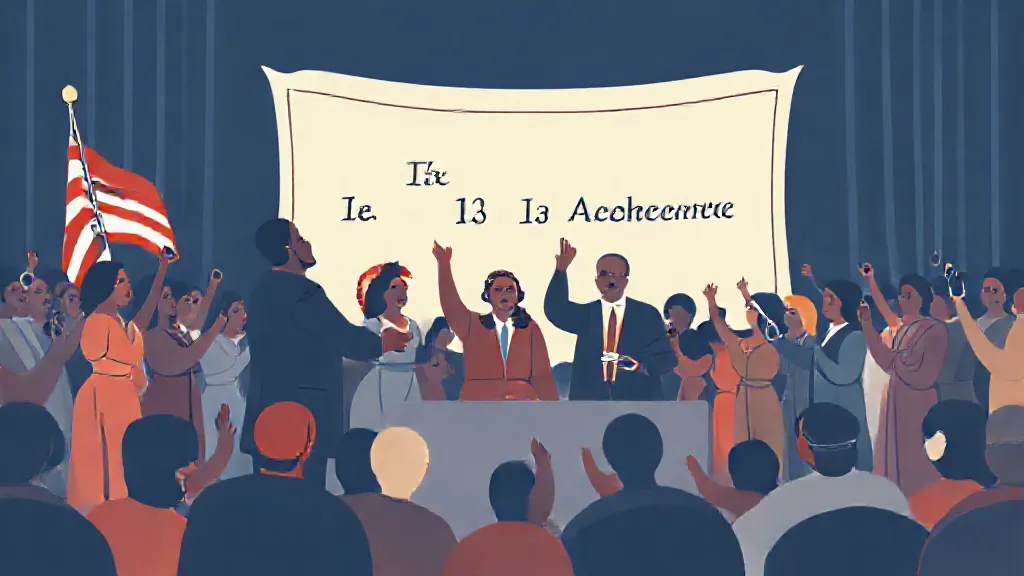The 13th Amendment to the United States Constitution, ratified on December 6, 1865, marked a pivotal moment in American history by abolishing slavery and involuntary servitude, except as punishment for a crime. This amendment not only liberated millions of enslaved individuals but also set the stage for a series of social, legal, and economic transformations in the United States. Understanding the implications of the 13th Amendment is crucial to grasping the evolution of American society and the ongoing struggles for civil rights.
The Historical Context of the 13th Amendment
To appreciate the significance of the 13th Amendment, one must consider the historical context in which it was enacted. The Civil War (1861-1865) was fought, in part, over the issue of slavery. The Union victory signaled a shift in power dynamics, leading to the necessity of constitutional amendments to ensure the rights of newly freed individuals.
The amendment was a response to the moral and political pressures of the time, including the abolitionist movement, which had gained momentum in the years preceding the war.
Legal Ramifications and Enforcement Challenges
Upon its ratification, the 13th Amendment provided a constitutional foundation for the legal abolition of slavery. However, its enforcement proved challenging.
The amendment granted Congress the power to enforce its provisions through appropriate legislation, leading to the passage of the Civil Rights Act of 1866 and subsequent laws. Despite these efforts, systemic racism and the establishment of Black Codes in Southern states sought to undermine the amendment's intent, revealing the deep-seated societal resistance to true equality.
Economic Impact on American Society
The abolition of slavery fundamentally altered the economic landscape of the United States.
The Southern economy, which had relied heavily on slave labor for agricultural production, faced significant upheaval. Freed individuals sought employment and autonomy, leading to the rise of sharecropping and tenant farming systems. While these systems offered some degree of independence, they often perpetuated cycles of poverty and economic exploitation, illustrating the complexities of transitioning from an enslaved to a free labor force.
Social Changes and the Rise of New Movements
The 13th Amendment catalyzed significant social changes, fostering the emergence of new movements advocating for civil rights and social justice. The Freedmen's Bureau was established to assist newly freed individuals in their transition to freedom, providing education, healthcare, and employment support. This period also saw the formation of various organizations aimed at advocating for the rights of African Americans, laying the groundwork for future civil rights movements.
Long-term Effects on Civil Rights Legislation
The legacy of the 13th Amendment extends beyond its immediate impact, influencing subsequent civil rights legislation. The amendment's principles were foundational for the 14th and 15th Amendments, which aimed to guarantee citizenship rights and voting rights for African Americans. These amendments collectively sought to dismantle institutionalized racism and ensure equal protection under the law, though their implementation faced significant resistance and challenges throughout American history.
Cultural Shifts and the Narrative of Freedom
The narrative of freedom and equality that emerged post-13th Amendment was not without complications. Literature, art, and music from the Reconstruction era and beyond reflected the struggles and aspirations of African Americans. Figures such as Frederick Douglass and later authors and activists used their platforms to advocate for a broader understanding of freedom that encompassed not only legal rights but also social and economic equality.
Contemporary Relevance and Ongoing Struggles
In contemporary America, the legacy of the 13th Amendment continues to resonate in discussions surrounding systemic racism, mass incarceration, and social justice. The clause allowing involuntary servitude as punishment for a crime has been critically examined, particularly in the context of the prison-industrial complex. Activists argue that this loophole perpetuates modern forms of slavery, highlighting the need for ongoing advocacy and reform to fulfill the promise of the amendment.
Conclusion: The 13th Amendment as a Catalyst for Change
In conclusion, the 13th Amendment was not merely a legal document; it was a catalyst for profound change in American society. Its effects ripple through history, influencing legal frameworks, economic systems, and social movements. While it marked the formal end of slavery, the struggle for true equality and justice continues, reminding us of the enduring significance of this landmark amendment in the ongoing quest for civil rights in America.
